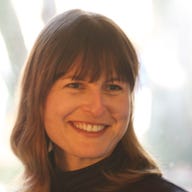DOE to manufacturers: We're cracking down, finally

Scott Blake Harris is the general counsel of the Department of Energy. He has practiced law in Washington for 34 years and said he did not give up his own firm to simply deal with “the flood of issues that inevitably come across every general counsel’s desk.” Rather, he made the move to make a difference in the department—today and long after he’s gone. This, he says, is the most important thing one can do as a political appointee.
Every day, Harris sets aside a couple hours to work on making these changes. He has a legal pad listing 15 to 18 different projects he is working on, aside from day-to-day issues. What he’s accomplished in his 10 months as general counsel seems extraordinary, given the pace at which government generally moves. Harris took a few minutes last week to talk to me about the four most important accomplishments.
1. Enforcement: Among the issues that come across my desk are energy efficiency regulations for thousands of different products and manufacturers. So I got here and said, “What do we do to enforce them?” The answer was that we were doing nothing to enforce them. So we set up an enforcement team, issued enforcement guidelines and offered a 30–day grace period for people to bring themselves into compliance. Then we issued the first subpoena in the history of this department. We now have a full enforcement program going, we are doing random testing of appliances, checking certification and bringing legal action against those not complying.
It’s not just playing gotcha with manufacturers; it’s about making real our commitment to consumers that our regulations are going to provide more energy efficient equipment and manufacturing in this country. Our department was even sued byLG Electronics. We pulled an Energy Star rating from them (because we believed one of the refrigerator/freezers was not as energy efficient as they claimed it to be). We won.
There is no enforcement mechanism where you can catch everybody. You want to let them know the law is being enforced. When the word gets around, they bring they bring themselves into compliance. We even have a button on our website where people can anonymously report violations. When one company violates the rules, their competitors that are following the rules are aggrieved.
2. Transparency: One of the things I believe strongly from my past experience in government, and that this administration believes, is that it’s important to let the public know what you are doing (and why) so the public can scrutinize us. Among the things I do [regarding the National Environmental Policy Act] is 200 to 400 environmental assessments (EA) and environmental impact statements (EIS). We make 2,000 to 4,000 decisions a year that are not subject to EAs and EISes These decisions are called categorical exclusions, or CX; the action, by its nature, cannot have an adverse impact on the environment. These decisions weren’t on the website. Which was crazy. If we’re making these decisions, they should be public. We got them on the website in September. We are the only agency in the federal government that does this.
3. Openness: This is different than transparency. Openness means encouraging people to come into the building. There’s not a history here of people coming in and talking to the general counsel’s office, and I’m trying to reverse that.
For example, we do a fair number of rule-makings. The previous guidance was that no members of the public came in to talk to us. But if all your decision-making is done on paper, it’s easy to hide the weaknesses of your decision. In talking to people, you can tease out what’s really going on. So I issued a guidance reversing that. My belief is that the more people we talk to, the better informed we will be. We put out a statement after each meeting to explain what was discussed, so if there’s someone out there with a different point of view, they can come in and talk to us as well. We accept all meetings, not just some.
The hardest thing is getting good information about what's going on outside our doors. You want a healthy and robust debate from all points of view. I want to create a virtuous cycle of all people coming in and arguing with us. It’s only by this that you come to the best decision.
4. Use of technology: I instituted a monthly call with state energy offices, which has never been done before. This gives them an opportunity to tell us about all the legal problems and concerns they’re having, so they wouldn’t find their activities would slow down because of legal issues. We also set up an email hotline that any state energy official could use to send us a question, and we promise to get an answer back to them in 48 hours.
We set up a FAQ page so as soon as we send an answer, it goes up on that page and is available to everyone. And last week on the FAQ page, we set up a listserv sign-up, so anyone signed up will get an immediately answer to all the new FAQs via email. We are now in the process of building listservs for our enforcement page as well.
This post was originally published on Smartplanet.com
